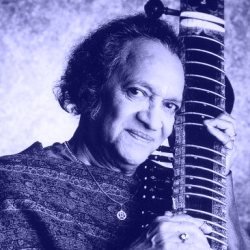
TRIBUTE
Pandit Ravi Shankar
born
on April 07, 1920 and
passed away on December 11, 2012.
The lanky figure with the long hair adding flair to his personality and the dominating presence that he had making the musical instrument Sitar what it is today on the world stage is unforgettable. Born as Robindro Shaunkor Chowdhury in Varanasi to a Bengali family, as the youngest of seven brothers, he spent his youth touring India and Europe with the dance group of his brother Uday Shankar. By the age of 13 toured and learned to dance and play various Indian instruments. His awesome talent found him and led him to discover Western classical music, jazz, cinema and he became acquainted with Western customs.
After giving up his dancing in 1938, he went on to study sitar playing under court musician Allauddin Khan. After finishing his studies in 1944, Shankar worked as a composer. Shankar recomposed the music for the popular song "Sare Jahan Se Achcha" at the age of 25. He began to record music for HMV India and worked as a music director for All India Radio (AIR), New Delhi, from February 1949 to January 1956. Shankar founded the Indian National Orchestra at AIR and in his compositions he created fusion of Western styles with classical Indian instrumentation. He scored the music for the Apu Trilogy by Satyajit Ray among the others.
It was the same year in 1956, he began his tour to Europe and the Americas, thus conquering the world of music. Playing Indian classical music and increasing its popularity abroad in the 1960s through teaching and performances, he developed his association with many incredible musicians. Ravi Shankar recorded most of his albums in the 1950s and 1960s for Bock's label with his friend Richard Bock who was the founder of World Pacific Records. The Byrds were influenced by Shankar's sound and incorporated some of its elements in theirs. These led to Shankar's association with violinist Yehudi Menuhin and Beatles guitarist George Harrison. And eventually to some incredible collaborations in Western music by writing his compositions for sitar and orchestra, and toured the world in 70's and 80's. The iconic track "Norwegian Wood (This Bird Has Flown)" was a result of Shankar's influence on George Harrison and this created a new sound in the world of rock music. Shankar's association with Harrison greatly increased Shankar's popularity and Ken Hunt of AllMusic stated that Shankar had become "the most famous Indian musician on the planet" at that time. In 1967, he performed at the Monterey Pop Festival and won a Grammy Award for Best Chamber Music Performance for West Meets East, a collaboration with Yehudi Menuhin.
What followed were, a western branch his Kinnara School of music in Los Angeles, an autobiography 'My Music, My Life', a score for the movie Charly, a spectacular performance at Woodstock Festival, Chairing the department of Indian music of the California Institute of Arts, offering lectures at colleges and Universities, composing a concerto with sitar for the London Symphony Orchestra and a second Grammy too for his concert album. He served as a nominated member of Rajya Sabha, the upper chamber of the Parliament of India. In 1999 Shankar was awarded India's highest civilian honour, the Bharat Ratna.
He was maestro who developed a distinct style of his own incorporating influences from the varied rhythms of Carnatic music and also had his unique pattern of performing. Beginning with pulsing solo influenced by dhrupad genre that was followed by a section with tabla, his performances featured compositions associated with khyal stye and he often closed with a piece inspired by thumri genre. He had his unique way of playing with the bass octave on the sitar creating an incredible sound through stops and strikes rhythmically.
Ravi Shankar lived a legendary life giving the most to the world of music and in the process found love at different stages of his celebrated life. Norah Jones and Anoushka Shankar were his daughters who have already conquered the world with their own contemporary and individual styles in music and across geographies.
"If you like our tuning so much, I hope you will enjoy the playing more." Those were his witty words in amusement when the crowd broke into applause after the musicians had tuned up on stage at the start of a concert. Celebrated with a title Pandit, he was an incredible Indian musician and composer who was one of the best-known exponents of the sitar in the second half of the 20th century as a composer of Hindustani classical music. Ravi Shankar continued to perform up until the end of his life, his last being with his daughter Anoushka on Nov'12 in California, thereby creating an era of music that will resonate forever.
This is a SoulPrints tribute to Pandit Ravi Shankar.
Guest Tributes

